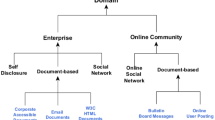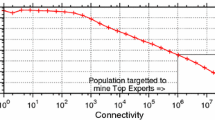Abstract
Building expertise profiles in global online communities is a critical step in leveraging the range of expertise available in the global knowledge economy. In this paper we introduce a three-stage framework that automatically generates expertise profiles of online community members. In the first two stages, document-topic relevance and user-document association are estimated for calculating users’ expertise levels on individual topics. We empirically compare two state-of-the-art information retrieval techniques, the vector space model and the language model, with a Latent Dirichlet Allocation (LDA) based model for computing document-topic relevance as well as the direct and indirect association models for computing user-document association. In the third stage we test whether a filtering strategy can improve the performance of expert profiling. Our experimental results using two real datasets provide useful insights on how to select the best models for profiling users’ expertise in online communities that can work across a range of global communities.


Similar content being viewed by others
Notes
We experiment various values for n words. Our results show that top-10 is a near optimal choice.
References
Ackerman, M., Pipek, V., & Wulf, V. (2003). Sharing Expertise: Beyond Knowledge Management. Cambridge: MIT Press.
Ardichvili, A., Page, V., & Wentling, T. (2003). Motivation and barriers to participation in virtual knowledge-sharing communities of practice. Journal of Knowledge Management, 7(1), 64–77.
Ardichvili, A., Maurer, M., Li, W., Wentling, T., & Stuedemann, R. (2006). Cultural influences on knowledge sharing through online communities of practice. Journal of Knowledge Management, 10(1), 94–107.
Balog, K., Azzopardi, L., & Rijke, M. D. (2009). A language modeling framework for expert finding. Information Processing and Management, 45(1), 1–19.
Bandura, A. (1986). Social Foundations of Thought and Action: A Social Cognitive Theory. Englewood-Cliffs: Prentice Hall.
Blei, D. M., Ng, A. Y., & Jordan, M. I. (2003). Latent dirichlet allocation. Journal of Machine Learning Research, 3, 993–1022.
Bourdieu, P. (1990). The Logic of Practice. Stanford: Stanford University Press.
Brown, J. S., & Duguid, P. (2000). The Social Life of Information. Boston: Harvard Business School Press.
Brown, J. S., & Duguid, P. (2001). Knowledge and organization: a social-practice perspective. Organization Science, 12(2), 198–213.
Campbell, C. S., Maglio, P. P., Cozzi, A., & Dom, B. (2003). Expertise Identification Using Email Communications. In Proceedings of the 12th International Conference on Information and Knowledge Management (pp. 528–531). New Orleans.
Chiu, C., Hsu, M., & Wang, E. (2006). Understanding knowledge sharing in virtual communities: an Integration Of Social Capital and Social Cognitive Theories. Decision Support Systems, 42, 1872–1888.
Cormack, G. V., Palmer, C. R., & Clarke, C. L. A. (1998). Efficient Construction of Large Test Collections. In Proceedings of the 21st Annual International ACM SIGIR Conference on Research and Development in Information Retrieval (pp. 282–289). Melbourne.
Cummings, J. N. (2004). Work groups, structural diversity, and knowledge sharing in a global organization. Management Science, 50(3), 352.
Demartini, G., Gaugaz, J., & Nejdl, W. (2009). A vector space model for ranking entities and its application to expert search. Advances in Information Retrieval, 5478, 189–201.
Fleiss, J. L. (1981). Statistical Methods for Rates and Proportions. New York: John Wiley.
Griffiths, T., & Steyvers, M. (2004). Finding scientific topics. Proceedings of the National Academy of Science, 101(Suppl 1), 5228–5235.
Heinrich, G. (2005). Parameter Estimation for Text Analysis, Technical Report, Web: http://www.arbylon.net/publications/text-est.pdf.2005.
Herzig, D., and Taneva, H. (2010). Multilingual Expert Search using Linked Open Data as Interlingual Representation. In Notebook Papers of the CLEF 2010 Labs and Workshops, Padua, Italy, Web: http://www.clef2010.org/resources/proceedings/clef2010labs_submission_59.pdf
Hinds, P. J., & Kiesler, S. (2002). Preface. In P. J. Hinds & S. Kiesler (Eds.), Distributed Work (pp. xi–xviii). Cambridge: MIT Press.
Holley, J. O., Luehr, P. H., Smith, J. R., & Schwerha, J. J., IV. (2010). Electronic discovery. In E. Casey (Ed.), Handbook of Digital Forensics and Investigation (pp. 135–209). Burlington: Elsevier Academic Press.
Johri, A. (2011). Sociomaterial bricolage: the creation of location-spanning work practices by global software developers. Information and Software Technology, 53(9), 955–968.
Johri, A. (2006). Interpersonal assessment: Assessing peer knowledge and behavior in online learning environments. In T. S. Roberts (Ed.), Self, Peer, And Group Assessment in E-Learning (pp. 283–312). Hershey: Idea Group Publishing.
Kotlarsky, J., & Oshri, I. (2005). Social ties, knowledge sharing and successful collaboration in globally distributed system development projects. European Journal of Information Systems, 14(1), 37–48.
Lee, D. L., & Seamons, K. (1997). Document ranking and the vector space model. IEEE Software, 14(2), 67–75.
Lin, H., Fan, W., & Zhang, Z. (2009). A qualitative study of Web-based knowledge communities: examining success factors. International Journal of E-Collaboration, 39(3).
Majchrzak, A., Rice, R., Malhotra, A., King, N., & Ba, S. (2000). Technology adaptation: the case of a computer-supported inter-organizational virtual team. MIS Quarterly, 24(4), 569–600.
McDonald, D. W., & Ackerman, M. S. (1998). Just Talk to Me: A Field Study of Expertise Location. In Proceedings of the 1998 ACM Conference on Computer Supported Cooperative Work (pp. 315–324). Seattle.
McDonald, D. W., & Ackerman, M. S. (2000). Expertise Recommender: A Flexible Recommendation System and Architecture. In Proceedings of the 2000 ACM Conference on Computer Supported Cooperative Work (pp. 231–240). Philadelphia.
McLachlan, G. J., Do, K.-A., & Ambroise, C. (2004). Analyzing Microarray Gene Expression Data. Hoboken: John Wiley & Sons, Inc.
Melucci, M. (2007). On rank correlation in information retrieval evaluation. ACM SIGIR Forum, 41(1), 18–33.
Mimno, D., & McCallum, A. (2007). Expertise Modeling for Matching Papers with Reviewers. In Proceeding of the 13th ACM SIGKDD International Conference on Knowledge Discovery and Data Mining (pp. 500–509). San Jose.
Nahapiet, J., & Ghoshal, S. (1998). Social capital, intellectual capital, and the organizational advantage. Academy of Management Review, 23(2), 242.
Newman, M. E. J., Watts, D. J., & Strogatz, S. H. (2002). Random graph models of social networks. Proceedings of the National Academy of Sciences, 99(suppl. 1), 2566–2572.
Palvia, P. (1998). Global information technology research: past, present, and future. Journal of Global Information Technology Management, 1(2), 6–29.
Papazafeiropoulou, A. (2004). Inter-country analysis of electronic commerce adoption in south eastern Europe: policy recommendations for the region. Journal of Global Information Technology Management, 7(2), 54–69.
Pipek, V., Wulf, V., & Johri, A. (2012). Bridging artifacts and actors: expertise sharing in organizational ecosystems. Journal of Computer-Supported Cooperative Work, 21(2–3), 261–282.
Remus, U., & Wiener, M. (2009). Critical success factors for managing offshore software development projects. Journal of Global Information Technology Management, 12(1), 6–29.
Ren, Y., Kraut, R. E., & Kiesler, S. (2007). Applying common identity and bond theory to the design of online communities. Organizational Studies, 28(3), 379–410.
Reichling, T., Veith, M., & Wulf, V. (2009). Expert recommender: Designing for a network organization. In J. M. Carroll (Ed.), Learning in Communities: Interdisciplinary Perspectives on Human Centered Information Technology (pp. 139–171). London: Springer-Verlag.
Serdyukov, P., Rode, H., & Hiemstra, D. (2008). Modeling Multi-step Relevance Propagation for Expert Finding. In Proceeding of the 17th ACM Conference on Information and Knowledge Management (pp. 1133–1142). Napa Valley.
Steyvers, M., Smyth, P., & Rosen-Zvi, M. (2004). Probabilistic Author-topic Models for Information Discovery. In Proceedings of the 10th ACM SIGKDD International Conference on Knowledge Discovery and Data Mining (pp. 306–315). Seattle.
Thomas, J. C., Kellogg, W. A., & Erickson, T. (2001). The knowledge management puzzle: human and social factors in knowledge management. IBM Systems Journal, 40(4), 863–884.
Wasko, M. M., & Faraj, S. (2005). Why should I share? Examining social capital and knowledge contribution in electronic networks of practice. MIS Quarterly, 29(1), 35–57.
Wei, X., & Croft, W.B. (2006). LDA-Based Document Models for Ad-Hoc Retrieval. In Proceedings of the 29th Annual International ACM SIGIR Conference on Research and Development in Information Retrieval (pp. 178–185). Seattle.
Yang, J., Adamic, L. A., & Ackerman, M. S. (2008). Competing to Share Expertise: the Taskcn Knowledge Sharing Community. In Proceeding of the International Conference on Weblogs and Social Media (pp. 161–170). Seattle.
Zar, J. H. (2009). Biostatistical Analysis. Englewood Cliffs: Prentice-Hall.
Zhai, C., & Lafferty, J. (2004). A study of smoothing methods for language models applied to information retrieval. ACM Transactions on Information Systems, 22(2), 179–214.
Zhang, J., Ackerman, M. S., & Adamic, L. (2007). Expertise Networks in Online Communities: Structure and Algorithms. In Proceedings of the 13th International World Wide Web Conference (pp. 221–230). Banff.
Acknowledgment
This work was partially funded by the U.S. National Science Foundation (Grant #0935124, #1122609, and #0840719) and the National Science Foundation of China (Grant #70872089 and #71072129). Any opinions, findings, and conclusions or recommendations expressed in this material are those of the authors and do not necessarily reflect the views of the funding agencies.
Author information
Authors and Affiliations
Corresponding author
Rights and permissions
About this article
Cite this article
Liu, X., Wang, G.A., Johri, A. et al. Harnessing global expertise: A comparative study of expertise profiling methods for online communities. Inf Syst Front 16, 715–727 (2014). https://doi.org/10.1007/s10796-012-9385-6
Published:
Issue Date:
DOI: https://doi.org/10.1007/s10796-012-9385-6




